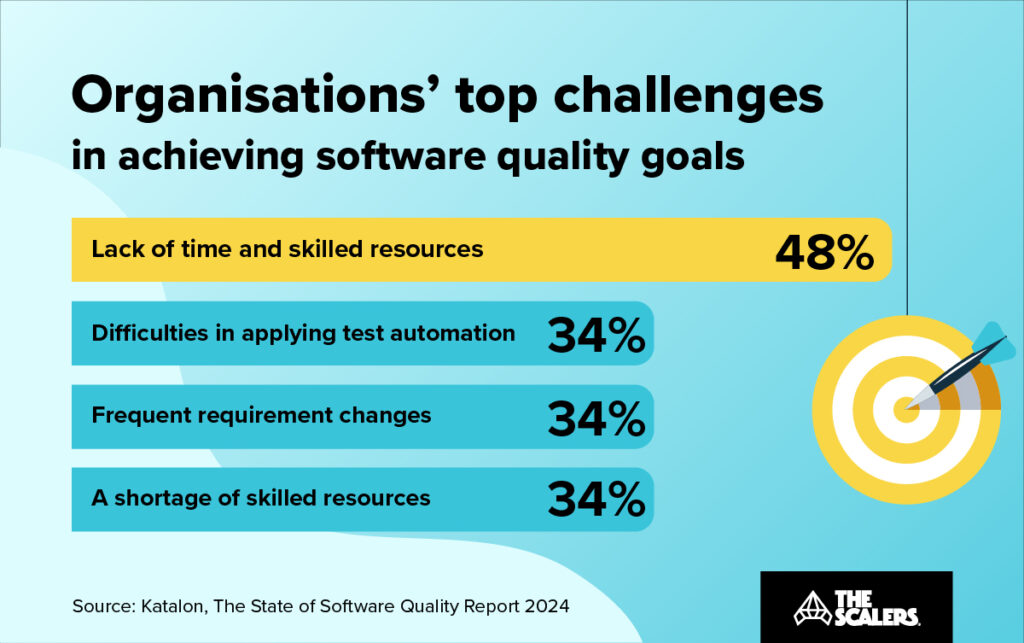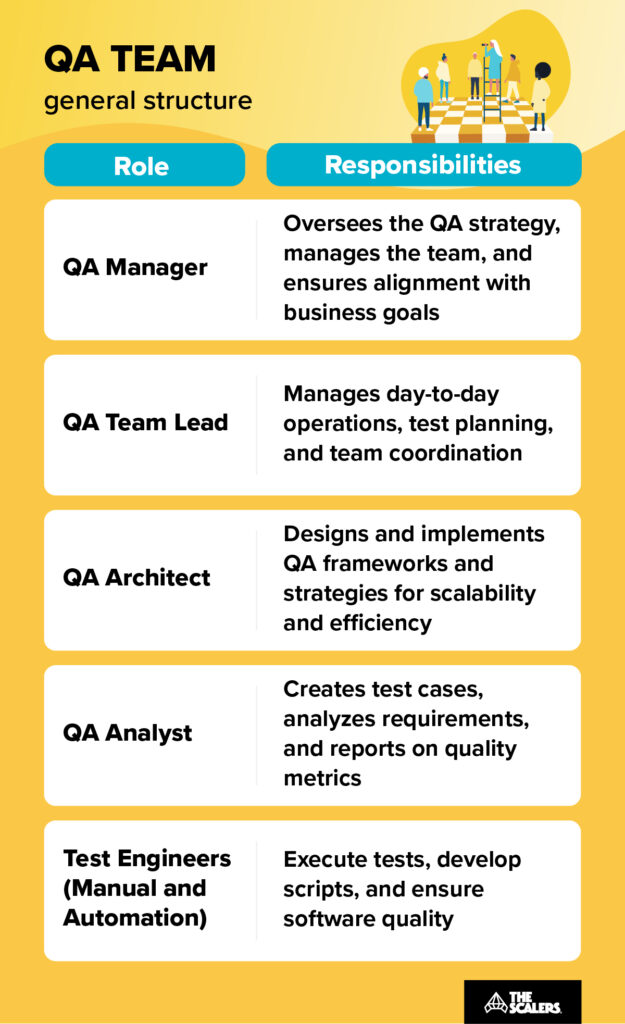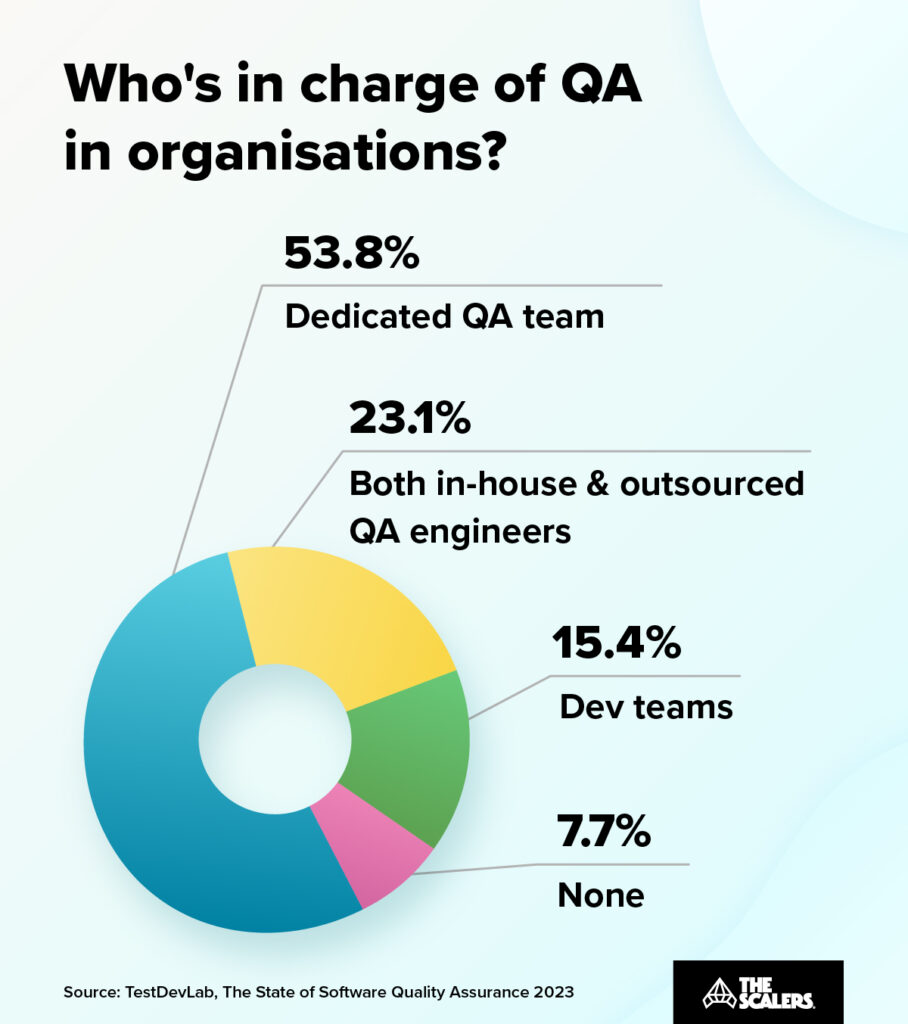You might be surprised at how many organisations leave quality assurance (QA) to chance — buried at the end of their backlogs and often forgotten.
According to The State of Software Quality Assurance 2023 report, 8% of companies still lack a dedicated QA team. Perhaps they lack in-house resources or just don’t know what steps to follow to hire a QA team with a proven engagement model elsewhere.
If that’s your case, this article will help you find the specialists you’re looking for. After reading it, you’ll know the benefits of building a QA team via offshoring and how to hire your new engineers.
We’ve written it by drawing on real-life experience. In the past 10+ years, we’ve built over 80 offshore dedicated teams with top QA talent for our partners.
Let’s start by pointing out the six main advantages of hiring QA engineers offshore:
1. Hire specialised QA talent in a global talent pool
Arguably, the major benefit of building an offshore QA team is finding, hiring, and onboarding professionals with specific skills your organisation needs.
When you opt for offshoring, the world is your talent pool. Quite literally. You can search for QA Managers or Automation Test Engineers with specific knowledge of your industry and its regulation, or experience with relevant automation frameworks and programming languages. Plus thriving tech hubs like Bangalore, India, are stocked full with professionals experienced working with Western companies.
With businesses citing shortages of skilled resources as one of their top challenges influencing quality goals — as shown in the infographic below from Katalon’s report — offshoring appears as an excellent alternative to hiring QA teams locally.

See Johnson Health Tech’s example. They’ve accelerated delivery with an 8-engineer Offshore Development Centre (ODC), where the Web Quality Automation Engineer plays a key role in their success.
2. Cut costs and enjoy excellent value for money
Building a world-class QA team in the US, Europe, or Australia can be daunting and (very) expensive. Firstly, you might not find the right talent to fill your requirements, and secondly, due to the prohibitive rates QA engineers command in these regions.
That’s why more and more tech leaders are considering offshoring to build, extend, and scale their teams. Unsatisfied with the talent availability in their home countries and the premium they need to pay to hire regular engineers, they’ve moved operations abroad.
Some of the best countries to hire software development talent include India, Poland, and Colombia. QA professionals living and working in Bangalore, Warsaw, or Bogota are as skilled (or more) than their Western counterparts and earn lower salaries due to the more affordable cost of living in these cities.
For example, a QA Engineer in India earns an average of ₹493,323 yearly ($5,800 approx.). An equivalent engineer in the US earns $78,467 yearly.
3. Build a high-performing, long-term QA team
At this point, you may be asking: why offshoring when I can also build a QA team through outsourcing?
The answer lies in the quality, commitment, and performance of your new engineers. Unlike outsourcing, offshoring allows you to build a team of elite professionals who can support your long-term business growth.
Don’t get us wrong. You can outsource QA engineers, but these are often project-based and juggle multiple clients, making them ideal for temporary tasks. If you need 100% dedicated engineers, offshoring is the way to go.
When done right, offshoring gives you an ‘in-house feeling’ you won’t get with outsourcing or other hiring and engagement models like nearshoring.
4. Scale your QA team when needed
Another reason to build a QA team with offshoring is the flexibility and scalability you can enjoy.
Let’s say your organisation has plans to build a QA team in another country and extend it on demand as the business grows. Well, thanks to offshoring, you can start with a handful of engineers and scale your team up to more than a hundred over time.
This is especially relevant if your company is undergoing an expansion phase or planning to release new products and needs to adjust testing resources rapidly. Offshoring allows you to quickly adapt your QA resources to meet evolving demands, ensuring you have the right team size and expertise at every stage of your growth.
“Growing a team from 0 to 100+ is of course a challenge. Having a trusted partner on the ground has made this much easier for us in terms of building the team culture in Bangalore and sourcing candidates — which would have been very, very challenging for us without The Scalers. Working with The Scalers has been a success, and I don’t say that lightly!”
5. Achieve round-the-clock operations
Many tech teams face heavy workloads and need 24/7 testing coverage for quicker turnaround times, especially in continuous integration and continuous development environments. In other words, they must support round-the-clock operations to keep the gears running.
That’s where offshoring comes in.
An offshore QA team works while your in-house team sleeps, ensuring that testing and quality assurance continue around the clock. This means you can address issues and make improvements without delays, leading to faster product releases and more efficient problem-solving.
For instance, when your London engineers finish their shift, your offshore QA team in India can pick up right where they left off. By the time your headquartered team is back at their desks, the code can be approved or ready for fixes. The result? Faster turnarounds and quicker releases.
Some companies consider geographical distance and time zone differences as offshoring cons, but the reality is that they can bring more benefits than drawbacks.
6. Focus on core business activities
While QA tasks are crucial to ensuring products are bug-free and meet organisational and customer requirements, they may not be your number one priority. As a tech or business leader, your focus might be aligning IT strategy, driving innovation, or delivering more value to your users.
If this situation sounds familiar, you should consider hiring an offshore QA team. This way, you and your in-house team can focus on critical work while your offshore engineers handle testing at every stage of the development process.
With the right offshore model, you can keep full control of your QA team and oversee operations even when your testers are thousands of miles away from your headquarters.
What are the key roles of a successful QA team?
The structure of a QA team can vary depending on the company’s size and industry. The infographic below outlines a typical QA team structure, highlighting key roles and the core responsibilities of each member.

QA Manager
The QA Manager is the backbone of the QA department, acting as the bridge between the team, partners, and other departments. They set the direction for testing by creating strategies tailored to each project.
Beyond strategy, the QA Manager keeps everything on track — staying within budget, meeting deadlines, and regularly updating all stakeholders.
QA Team Lead
The QA Team Lead oversees the team’s day-to-day tasks. Unlike the QA Manager — who handles broader administrative duties — the Team Lead works side-by-side with team members to spot and fix issues as they come up.
They are directly involved in testing, creating test plans, and documenting every step of the process.
QA Architect
The QA Architect creates and designs the testing infrastructure the QA team uses. They analyse project requirements and build frameworks that meet those needs.
Their work involves architecting reusable test cases, developing automation frameworks, and integrating the latest methodologies to improve testing efficiency and quality.
QA Analyst
QA Analysts analyse test results to find areas of improvement.
They create and prioritise test cases, provide updates on test results, and verify that key product requirements are met.
Test Engineers (Manual and Automation)
Test or QA Engineers ensure final products meet quality standards before they reach the market.
Manual QA Engineers design and execute test plans manually, without automated testing tools or scripts, and investigate problems that arise after launch. Their work involves detailed, hands-on testing to catch subtle bugs.
Automation QA Engineers use automated testing tools to test software, create and maintain scripts to optimise the QA process, and update testing frameworks to meet evolving needs.
How to hire a QA team via offshoring (step by step)
If you want to build a world-class offshore team, you must follow a strategy aligned with your business goals. One that specifies how many professionals you need, where to move operations, and with whom to partner.
Here are the three steps you should consider when hiring or extending your QA team:
Step 1: Define the size of your offshore QA team
The size of your new team may be defined by many factors, one of which is your immediate requirements. For example, if you have regular updates and releases, a steady team of 3-4 offshore QA Engineers can ensure consistent quality.
Another consideration that can impact your hiring plans is whether you want to set up an offshore dedicated team from the ground up or extend your in-house QA capabilities. Some companies prefer to have a combination of offshore and in-house talent to cover QA tasks, while others opt to search for the right talent abroad.
Either way, you can always extend your QA team whenever needed. Offshoring allows you to scale and hire more QA professionals (and even other roles including developers and data scientists) as your organisation expands.

Step 2: Choose the right location to offshore QA talent
One of the most critical decisions you’ll need to make when offshoring QA talent is where to build your team. After all, each country varies in how easily you can navigate legalities, HR, and administrative tasks, as well as the quality of talent available.
Here’s a quick overview of some top offshoring destinations for building a QA team:
- In Asia, you can offshore to India if you’re looking for QA engineers possessing niche skills and high English proficiency.
- In Europe, countries like Poland and Romania are popular offshoring locations with a high concentration of QA talent in cities like Warsaw, Krakow, and Bucharest.
- In Latin America, Colombia, Argentina, and Mexico are emerging engineering hotspots with professionals who offer competitive rates and strong technical knowledge.
However, none of this matters if you don’t have a trusted offshore partner to bring your team to life…
Step 3: Pick an offshore partner with demonstrated experience
The last step to building your ideal QA team is to find a partner that assists you in searching, hiring, onboarding, and engaging your offshore engineers.
But, from all the offshore development companies who may present you (apparently) irresistible offers, how can you distinguish between a good partner and a top-class one?
While you can evaluate vendors based on their communication approach or on their leadership board, the best way to verify an offshore partner is through its success stories and proven experience.
A company that has an extensive track record of building resilient, high-performing offshore teams with top QA talent is more likely to provide a better service to its partners.
This reputation not only indicates superior quality but also influences the cost of hiring a QA team. Collaborating with a reliable offshore partner may seem like a significant investment upfront, but given the unique advantages some companies offer, it pays off.
One of these benefits is doing all the heavy lifting for you. This means handling HR and administrative tasks, legalities, infrastructure, and other duties, so your hands are off.
That’s exactly what we do at The Scalers. Our partners don’t need to worry about local regulations or get bogged down by daunting tasks. Instead, they can focus on growing their products and making strategic decisions.
Business leaders we work with often emphasise the importance of having a dedicated team that feels connected and committed. Our model ensures their engineers remain engaged, happy, and motivated, keeping our attrition rate below 15% — compared to 34% at other Indian offshore companies.
The Scalers are different from other partners I’ve worked with in the past as I don’t have to worry about any of the legal issues; any of the HR issues; any of the IT issues; or any of the building requirements. All I have to do is get up and go at the scale and the speed that I need to.
Sounds appealing?
If you’re ready to hire a QA team via offshoring or just want to know more about our unique (and proven) model, fill out this contact form. One of our senior executives will get back to you promptly.
In summary
And that’s a wrap!
As you’ve learnt, offshoring is a hiring and engagement model that can help you set up and extend your QA team on demand in some of the world’s most talent-rich locations.
Plus, working hand in hand with an offshore partner who understands your unique needs is synonymous with success.
Key takeaways:
-
1
Offshoring QA teams provides access to a global talent pool, allowing you to hire professionals with niche skills that match your specific needs.
-
2
Building an offshore QA team is more cost-effective than hiring locally and offers excellent value for money.
-
3
An offshore QA team can be built for long-term collaboration, ensuring consistent quality and dedication to your business growth.
-
4
Offshoring offers the flexibility to scale your QA team as needed.
-
5
With offshore QA teams, you can achieve continuous testing and quality assurance across different time zones, speeding up product releases and addressing issues faster.
-
6
Partnering with an experienced offshore provider means they can handle HR, legal, and administrative tasks, allowing you to focus on strategic business activities.
If you’ve found this blog post helpful, you’ll probably enjoy our guides on offshore software development and building tech teams. Take a look at some of our recent articles on these topics below!
Build Your Team,
Not Just a Contract
With The Scalers’ offshore dedicated development team, you get engineers who join your workflow for the long run. Grow steadily, stay flexible, and work with people who care about the product as much as you do.










